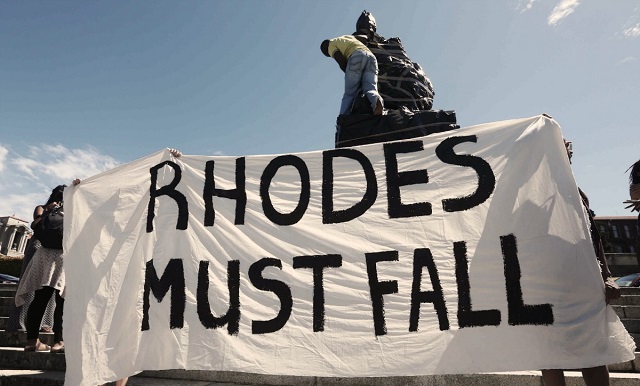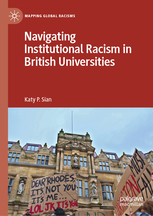“Too white, too male, and out of date”: Decolonising the Curriculum in British Universities Analysis
New in Ceasefire - Posted on Thursday, July 18, 2019 8:03 - 0 Comments
By Katy P. Sian

From my own experience of years of being based within sociology departments, it is with confidence that I can say that the social sciences have been central in reproducing Eurocentric knowledge formations. Calls to decolonize the curriculum seek to introduce different histories, alternative philosophies, and broader concepts, which combine to displace, or rather, decentre, Eurocentric thought and practice within the academy. Such calls are not to suggest that universities should simply eradicate European ideas, but rather to recognize the limitations of these concepts within pedagogical practice across disciplines. This critique has gained momentum over the past few years, and has been a key intellectual argument for many decades. In the public domain, however, the debate is perhaps not all as new as we may think it is.
I was first introduced to attempts to decolonise the curriculum back in the early 1990s through the popular American TV sitcom, The Fresh Prince of Bel-Air. This points to how mainstream the debates around decolonizing the curriculum had become in the US, but also signals to the marginality of these topics in popular British culture. The episode of particular interest, entitled The Ethnic Tip, first aired in 1991 and is based around Will’s attempt to get Black history taught in his American history class. After being called up on his poor marks, he complains to his Aunt Viv that, “We don’t learn nothing about the Black people in American history.” Sympathetic to his frustrations Aunt Viv says, “Don’t just complain, baby, take action! Write a statement about why more Black history should be added to the curriculum. Present it at next week’s parent-teachers’ meeting.” Will follows her advice and outlines his argument at the meeting:
“We learn about George Washington and Thomas Jefferson and them other dudes that wound up on money but what about Martin Luther King and Crispus Attucks and all the other Black people that made a difference in this country?”
To which the teacher responds:
“First, in my course, we are trying to condense 200 and some odd years of history into nine months of lessons. Obviously, we have to concentrate on some historical figures and exclude others. Second, our school has a fine library, or so I’ve been told, where any student can study more about Black history. Third: For years I have taught my course from this well-respected textbook and quite frankly, I don’t know a lick more than what’s in this book. So forget it… It certainly will take some time to revise the curriculum”
Not to simply reduce the decolonizing the curriculum campaign to an episode of Fresh Prince, but the exchange nonetheless is interesting, as it demonstrates the various tensions between those calling for change, and the all-too-familiar response with which that call is met. In my research on institutional racism in British universities, I interviewed a range of non-white academics who had faced similar institutional challenges. While my respondents all saw the value of decolonizing the curriculum, they spoke of the lack of support from their white colleagues and senior managers. For example as one respondent said:
“There have been moves here around decolonizing the curriculum. We’ve been able to introduce more writers and thinkers of colour within the content and we’ve also taken part in surveys to address what we’re doing and not doing. But this activity has had no impact on white staff members; they’re definitely opposed to decolonizing the curriculum, in my experience they haven’t welcomed this change at all.”
Another commented:
“The only activity I’ve seen in my university on decolonizing the curriculum has been PhD-led, so it’s not something that’s embedded in the structure. The curriculum is too white, too male and out of date, and there’s no desire at the top to change that.”
The responses demonstrate the way in which intellectual agendas in British universities continue to maintain a narrow, inward looking perspective that reinforces Orientalism and whiteness/Europeaness; such a vision is sustained and reproduced by those at the top. There was also a sense that for the few institutions that have gradually acknowledged the importance of decolonising the curriculum, such recognition was less about structural reform and more about market-driven logics:
“My department seems to have suddenly realised that there is a market for anti-racist and decolonial scholarship. So it’s become a ‘niche’ area of focus as a way to differentiate themselves. This is a market-based approach, so it’s only based on the idea that more students will come to take prospective courses, rather than being about social justice.”
The risk, then, of neoliberal universities co-opting the cause of decolonising the curriculum remains. However, we have to be alert to the emancipatory possibilities, even within that act of co-option. Perhaps the most common opposition to decolonising the curriculum is the (false) claim that the campaign seeks to make all forms of European knowledge redundant. This silly complaint appears to be more reflective of the insecurities of those in dominant positions, who are not quite ready to let go of their arrogant fantasies of superiority.
Calls to decolonize the curriculum do not simply suggest that, because the social sciences are European they are ‘wrong,’ or that we should eradicate European categories and frameworks. The arguments around decolonising education as a whole are rooted in the recognition of the limitations of dominant concepts, practices, and tools, within pedagogical spaces.
 Such reflexivity ensures that students are equipped with more complex and critical understandings of global debates and issues, in other words, the key goal of decolonizing the curriculum is to generate a more productive and insightful account of not only how the world we live in came to be but also how it can be. Decolonizing the curriculum is thus vital to both the transformation of higher education, and the development of inclusive spaces.
Such reflexivity ensures that students are equipped with more complex and critical understandings of global debates and issues, in other words, the key goal of decolonizing the curriculum is to generate a more productive and insightful account of not only how the world we live in came to be but also how it can be. Decolonizing the curriculum is thus vital to both the transformation of higher education, and the development of inclusive spaces.
For further details of this discussion, see: Sian, K. (2019) Navigating Institutional Racism in British Universities, Palgrave.



Leave a Reply